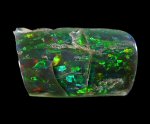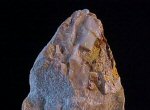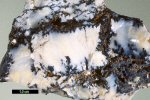| |
 |
Opal Mineral Data
|
|
|
General Opal Information
|
 Chemical Formula: Chemical Formula: |
SiO2•n(H2O) |
 Composition: Composition: |
Molecular Weight = 87.11 gm |
| |
Silicon 32.24 % Si 68.98 % SiO2 |
| |
Hydrogen 3.47 % H 31.02 % H2O |
| |
Oxygen 64.29 % O |
| |
______ ______ |
| |
100.00 % 100.00 % = TOTAL OXIDE |
 Empirical Formula: Empirical Formula: |
SiO2•1.5(H2O) |
 Environment: Environment: |
Sedimentary and secondary from the alteration of high silica igneous extrusive rocks. |
 IMA Status: IMA Status: |
Valid Species (Pre-IMA) Prehistoric |
 Locality: Locality: |
World wide occurrences. Link to MinDat.org Location Data. |
 Name Origin: Name Origin: |
From the Old Indian upala - "precious stone." |
 Name Pronunciation: Name Pronunciation: |
Opal  |
 Synonym: Synonym: |
Fire Opal - red |
| |
Hyalite - glassy |
| |
Hydrophane - porous |
| |
Prase - green |
| |
Precious opal - opalescent |
| |
Opal Image |
 Images:
Images:
|
|
 Images:
Images:
|

|
Opal
Comments: Section of fossilized tree limb that is now completely replaced by black opal.
Location: Virgin Valley District, Humboldt Co., Nevada, USA.
Scale: 20x13x11 mm.
© John Betts - Fine Minerals |
|
 Images:
Images:
|
|
Opal Crystallography
|
 Crystal System: Crystal System: |
Amorphous- No Crystals |
| |
Physical Properties of Opal
|
 Cleavage: Cleavage: |
None |
 Color: Color: |
White, Yellow, Red, Brown, Blue. |
 Density: Density: |
1.9 - 2.3, Average = 2.09 |
 Diaphaneity: Diaphaneity: |
Transparent to translucent to opaque |
 Fracture: Fracture: |
Conchoidal - Fractures developed in brittle materials characterized by smoothly curving surfaces, (e.g. quartz). |
 Habit: Habit: |
Amorphous - No crystalline form or imitative shape. |
 Habit: Habit: |
Massive - Uniformly indistinguishable crystals forming large masses. |
 Habit: Habit: |
Reniform - "Kidney like" in shape (e.g.. hematite). |
 Hardness: Hardness: |
5.5-6 - Knife Blade-Orthoclase |
 Luminescence: Luminescence: |
Fluorescent, Short UV=greenish yellow, Long UV=white. |
 Luster: Luster: |
Vitreous - Dull |
 Streak: Streak: |
white |
| |
Optical Properties of Opal
|
 Gladstone-Dale: Gladstone-Dale: |
CI meas= 0.177 (Poor) - where the CI = (1-KPDmeas/KC)
KPDmeas= 0.2048,KC= 0.2489
Ncalc = 1.47 - 1.57 |
 Optical Data: Optical Data: |
Isotropic, n=1.43. |
| |
Calculated Properties of Opal
|
 Electron Density: Electron Density: |
Bulk Density (Electron Density)=2.17 gm/cc
note: Specific Gravity of Opal =2.10 gm/cc.
|
 Fermion Index: Fermion Index: |
Fermion Index = 0.01
Boson Index = 0.99 |
 Photoelectric: Photoelectric: |
PEOpal = 1.32 barns/electron
U=PEOpal x rElectron Density= 2.86 barns/cc.
|
 Radioactivity: Radioactivity: |
GRapi = 0 (Gamma Ray American Petroleum Institute Units)
Opal is Not Radioactive |
| |
Opal Classification
|
 Dana Class: Dana Class: |
75.02.01.01 (75)Tectosilicate Si Tetrahedral Frameworks |
| |
(75.02)SiO2 with H2O and organics |
| |
(75.02.01)Dana Group |
| |
75.02.01.01 Opal SiO2•n(H2O) None |
 Strunz Class: Strunz Class: |
04.DA.10 04 - OXIDES (Hydroxides, V[5,6] vanadates, arsenites, antimonites, bismuthites, sulfites, selenites, tellurites, iodate |
| |
04.D - Metal:Oxygen = 1:2 and similar |
| |
04.DA -With small cations |
| |
04.DA.10 Opal SiO2•n(H2O) None |
| |
04.DA.10 Tridymite SiO2 F1 1 |
| |
Other Opal Information
|
 References: References: |
NAME( Duda&Rejl90) PHYS. PROP.(Dana) OPTIC PROP.(Enc. of Minerals,2nd ed.,1990) |
 See Also: See Also: |
Links to other databases for Opal :
1 - Alkali-Nuts(English)
2 - Am. Min. Crystal Structure Database
3 - Amethyst Galleries' Mineral Gallery
4 - Athena
5 - CalTech Mineral Spectroscopy
6 - GeoScienceWorld
7 - Glendale Community College
8 - Google Images
9 - Google Scholar
10 - MinDAT
11 - Mineral and Gemstone Kingdom
12 - Mineralienatlas (Deutsch)
13 - Online Mineral Museum
14 - Philatelic Mineralogy
15 - QUT Mineral Atlas
16 - Ruff.Info
17 - Scandinavian mineral gallery
18 - Tradeshop.com - The Rainbow of Gems
19 - University of Texas at Austin
20 - theimage
Search for Opal using:
[AOL]
[Bing]
[Dog Pile]
[GeoScienceWorld]
[HotBot]
[Ixquick]
[Lycos]
[MAMMA]
[Scirus]
[Teoma]
[WebCrawler]
[Wikipedia]
[YAHOO]
Visit our Advertisers for Opal :
Ask about Opal here :
Ask-A-Mineralogist from the Mineralogical Society of America
Mindat.org's Discussion Groups
Original Rockhounds Discussion Group
Rockhounds Discussion Group on Yahoo Groups
Mineral Discussion Forum from Fabre Minerals - also available in
Espa�ol
Print or Cut-and-Paste your Opal Specimen Label here :
|
Opal
SiO2•n(H2O)
Dana No: 75.02.01.01 Strunz No: 04.DA.10
Locality:
Notes:
|
|
| |
| |
|
| |
Dakota Matrix
Excalibur Minerals
Exceptional Minerals
Hudson Insitute
John Betts Fine Minerals
Mc Dougall Minerals
Mineral News
Rock and Mineral Shows
Weinrich Minerals, Inc.




